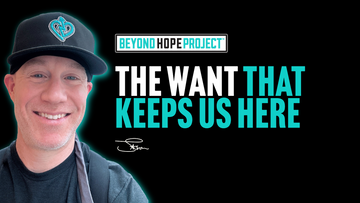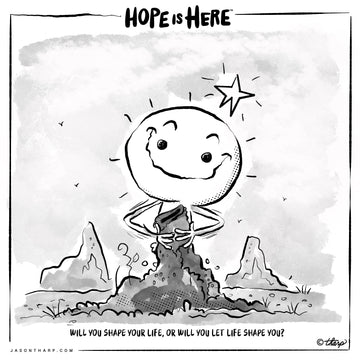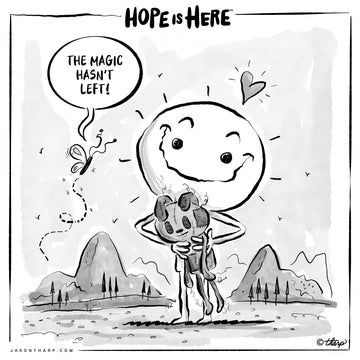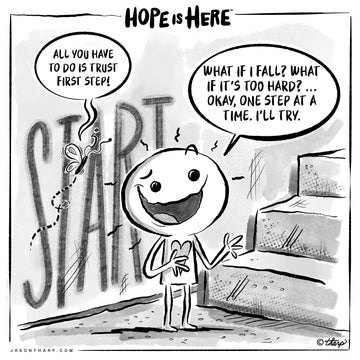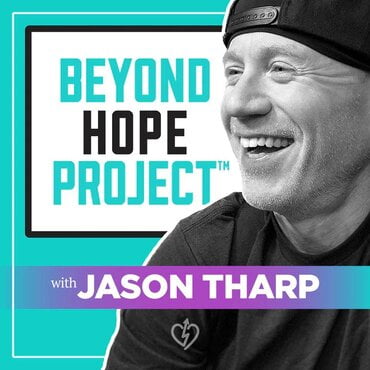Four years into my brain cancer survival, someone asked me a question that made me realize something I'd never put into words: "Do you feel like you have to keep fighting, or do you want to?"
The answer came immediately, almost instinctively: I want to.
It wasn't some profound moment of discovery. This feeling had been there all along, guiding me without me even realizing it. The want to survive, to keep going, to see what happens next had always felt innate to me.
Early on, I determined that since there's no genetic destiny that predetermined my GBM, I must have somehow created it. Which also means I could be the thing that creates the conditions where it doesn't come back.
So when people talk about "fighting cancer," I have a different approach entirely. I believe what you think about, you bring about. If every morning I wake up to fight cancer, that means cancer must be present in my body for me to fight. I'm thinking from the problem, not from the solution.
Instead of choosing to fight cancer and thus fighting myself, I choose to live every day. I choose to create a world in my mind and body where cancer doesn't exist.
Now, I want to be clear: I'm making some broad observations here based on conversations with other long-term survivors I've met along this journey. Every survivor's experience is unique, and I'm only speaking to what feels like common ground among those I've connected with.
There's this unspoken assumption about survivors. That we're driven by some noble obligation to keep fighting. That we battle because we have to, because giving up isn't an option, because other people need us to be strong.
But here's what I've discovered in the quiet moments between treatments, in the space between hope and fear: The most profound truth about long-term survival isn't that we have to keep going. It's that we genuinely want to.
Shift
The frustration of survival isn't about the physical battle. It's about the emotional complexity that nobody talks about.
Long-term survivors carry a secret that feels almost taboo to admit: Sometimes we're frustrated not by the dying, but by the living. Not because life is terrible, but because survival comes with a weight that healthy people don't understand.
We're expected to be grateful every moment. To see every sunrise as a gift. To never complain, never feel tired, never question why we're still here when others aren't.
But here's what I've learned: The survivors who thrive aren't the ones who feel obligated to live. They're the ones who discover an innate, almost inexplicable want to keep experiencing this messy, beautiful, impossible thing called life.
It's not about duty. It's not about proving something. It's not even about inspiring others, though that might happen along the way.
It's about recognizing that deep inside, beneath all the medical appointments and worried faces and well-meaning advice, there's something in us that simply wants to see what happens next.
That want isn't weakness. It's not selfish. It's the most honest thing about us.
Uplift
To acknowledge that we want to live, not that we have to, is perhaps the most empowering realization a survivor can have.
When you strip away the obligations, the expectations, the pressure to be inspirational, what's left? A choice. A genuine, personal, completely yours choice to keep going.
Here's how this shifts everything using the H.O.P.E. Algorithm:
• Hyper-Aware: Notice the difference between surviving out of obligation versus surviving out of genuine desire. One feels heavy. The other feels like freedom.
• Open-Hearted: Be honest about the frustrations of survival. You're allowed to be tired. You're allowed to question. You're allowed to want to live on your own terms.
• Persistent: Understand that persistence rooted in want is sustainable. Persistence rooted in obligation burns out. Choose the fuel that actually powers you forward.
• Empowering: Recognize that your choice to stay, your genuine want to keep going, gives others permission to examine their own relationship with living.
The frustration of survival often comes from trying to live up to everyone else's idea of what a survivor should be. But what if you just lived as someone who wants to be here?
You don't owe anyone your survival. But if you want to stay, that want is sacred.
Every morning you wake up and choose to engage with life, not because you have to, but because something in you is curious about today, that's not obligation. That's the most authentic form of hope there is.
Hope isn't a passive wish. It's a strategy. And sometimes, the most strategic thing you can do is admit that you're not here because you have to be. You're here because you want to be.
You're allowed to want to live. You're allowed to choose your own reasons for staying. You're allowed to survive on your own terms.
The world needs people who genuinely want to be here, not people who feel obligated to stay. Your want matters. Your choice matters. Your reasons matter.
Keep going because you want to. That's reason enough.
Ready to explore your own relationship with survival and choice? Visit beyondhopeproject.com for resources that honor your authentic journey.

